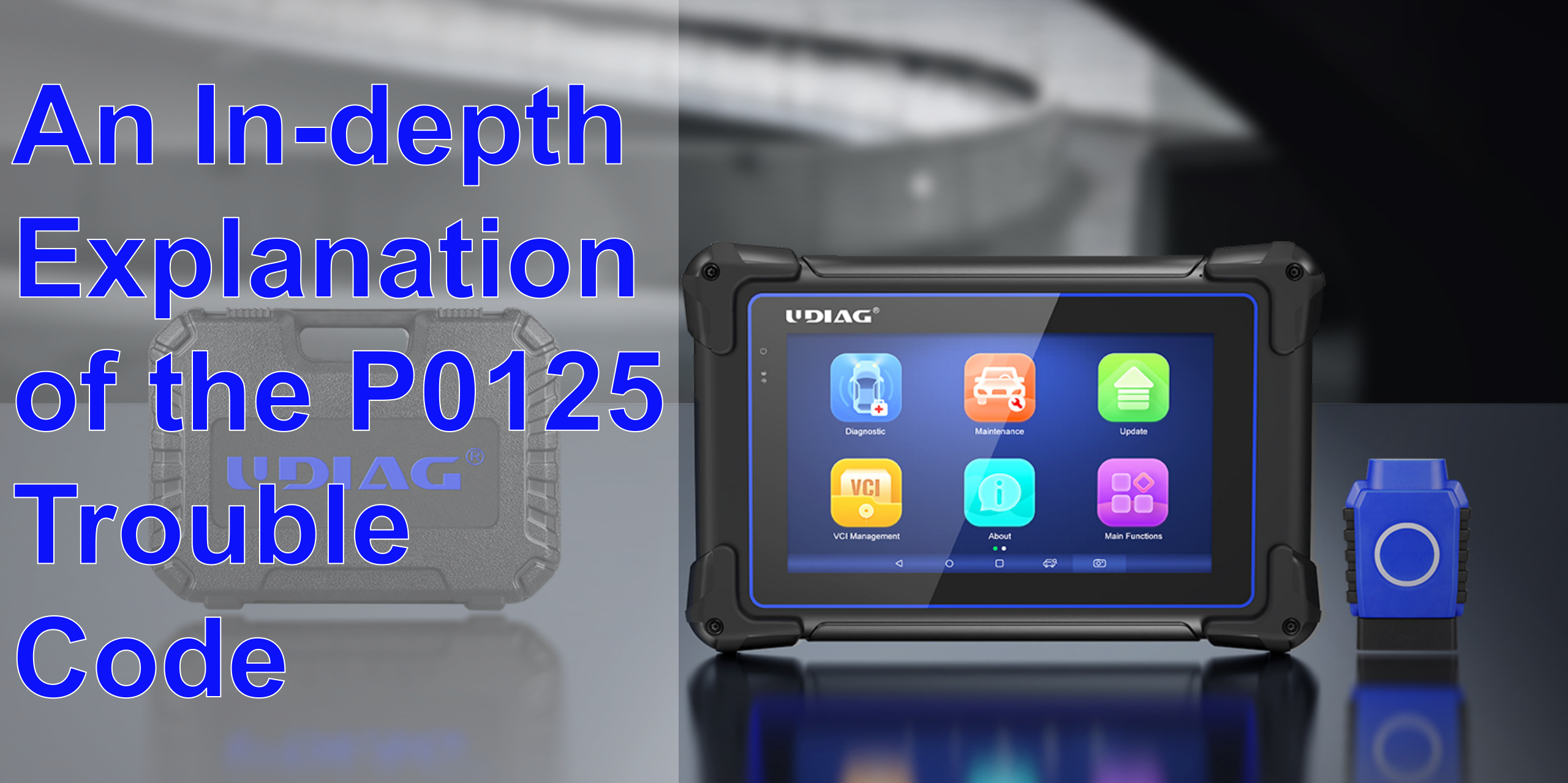An In-depth Explanation of the P0125 Trouble Code
2023-06-01 by UDIAG
The modern automotive industry is built upon advanced technology and intricate systems that work together to ensure optimal performance, efficiency, and reliability. One crucial aspect of maintaining a well-functioning vehicle is understanding and addressing diagnostic trouble codes (DTCs) that may arise. In this essay, we delve into the P0125 OBD-II trouble code, exploring its significance, symptoms, causes, effects on engine performance, preventive measures, and the consequences of ignoring it.

Symptoms and Causes of P0125 OBD-II Trouble Code
- Common symptoms associated with the P0125 Trouble Code
When the P0125 code is triggered, several symptoms may manifest. These include an illuminated check engine light on the dashboard, decreased fuel efficiency, engine hesitation or stalling, rough idling, and difficulty starting the engine in cold conditions.
- Causes of the P0125 Code
- Malfunctioning ECT sensor: A faulty ECT sensor may provide incorrect temperature readings to the ECM/PCM, leading to improper fuel delivery and ignition timing.
- Thermostat issues: A stuck-open or stuck-closed thermostat can prevent the engine from reaching its optimal operating temperature within the specified time frame.
- Coolant system problems: Leaks, blockages, or insufficient coolant levels can disrupt the engine’s cooling system and result in inadequate temperature regulation.
- Wiring or connector faults: Damaged or loose wiring connections between the ECT sensor and ECM/PCM can cause inaccurate temperature readings.
- ECM/PCM issues: A malfunctioning ECM/PCM may not properly interpret the signals from the ECT sensor, leading to incorrect temperature readings and the triggering of the P0125 code.
Effects of P0125 OBD-II Trouble Code on Engine Performance
- Impact on fuel efficiency
The P0125 code can negatively affect fuel efficiency due to the engine running at suboptimal temperatures. The ECM/PCM relies on accurate temperature data to adjust the air-fuel mixture, and when the engine runs cooler or hotter than intended, fuel consumption can increase.
- Altered engine performance and drivability
When the engine operates below the recommended temperature, it may not perform optimally. This can result in decreased power, reduced acceleration, and overall diminished drivability. The vehicle may feel sluggish and unresponsive, impacting the overall driving experience.
- Potential risk of engine overheating
While the P0125 code usually indicates that the engine is not reaching the desired temperature, it is essential to note that prolonged running at below-optimal temperatures can cause overheating in certain situations. If the cooling system is not functioning correctly, it may not be able to dissipate heat efficiently, leading to engine overheating.
- Contribution to increased emissions
The P0125 code can contribute to increased emissions due to the engine running outside its optimal temperature range. When the engine is cold, fuel combustion is less efficient, resulting in higher emissions of pollutants such as carbon monoxide (CO) and hydrocarbons (HC).
Impact of Ignoring the P0125 OBD-II Trouble Code
- Increased risk of engine damage
Ignoring the P0125 code can increase the risk of engine damage, especially if the engine consistently operates at suboptimal temperatures or experiences overheating. Over time, this can lead to accelerated wear and potential failures in various engine components.
- Potential for more severe malfunctions
Neglecting the P0125 code can contribute to the development of more severe malfunctions within the cooling system and other related systems. For example, prolonged coolant leaks can lead to engine overheating, warped cylinder heads, or even a blown head gasket.
- Higher repair costs in the long run
Delaying repairs for the P0125 code can result in more extensive damage and higher repair costs in the long run. Timely identification and resolution of the underlying issues can help prevent additional damage and subsequent costly repairs.
- Safety concerns related to engine performance
The P0125 code can affect engine performance and drivability, which can pose safety concerns on the road. Reduced power and responsiveness may compromise the vehicle’s ability to accelerate, pass other vehicles, or respond quickly to unexpected situations, potentially endangering the driver and passengers.
Preventive Measures for Avoiding P0125 OBD-II Trouble Code
- Regular maintenance of the cooling system
To prevent the occurrence of the P0125 code, regular maintenance of the cooling system is crucial. This includes routine checks for coolant leaks, inspecting hoses and connections for damage or deterioration, and ensuring proper coolant levels.
- Checking and replacing faulty components
Regular inspections of the ECT sensor, thermostat, and other cooling system components are essential. If any of these parts show signs of malfunction or wear, they should be promptly replaced to prevent potential issues.
- Monitoring coolant levels and quality
Regularly checking the coolant levels and quality can help identify any leaks or contamination in the system. Maintaining the correct coolant concentration and ensuring it is clean and free of debris is vital for optimal cooling system performance.
- Following manufacturer’s recommended service intervals
Adhering to the manufacturer’s recommended service intervals for coolant system maintenance and overall vehicle servicing is essential. This includes scheduled inspections, coolant flushes, and component replacements to address potential issues before they escalate.
- Taking immediate action when detecting related symptoms
If any symptoms associated with the P0125 code are detected, it is crucial to take immediate action. Ignoring the warning signs and postponing repairs can lead to further damage and more severe malfunctions.
Conclusion
Proactive maintenance and timely repairs are essential in avoiding the P0125 code and other potential issues. Regular inspections, coolant system maintenance, and prompt component replacements contribute to optimal cooling system performance and overall vehicle health.
When dealing with the P0125 code or any other automotive issues, it is recommended to consult a qualified technician. These professionals have the expertise, diagnostic tools, and knowledge to accurately diagnose the problem and provide appropriate solutions.


